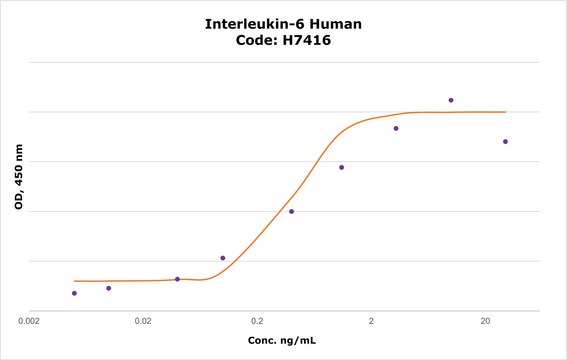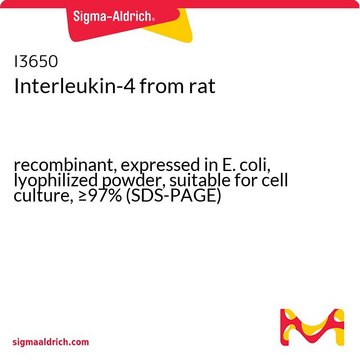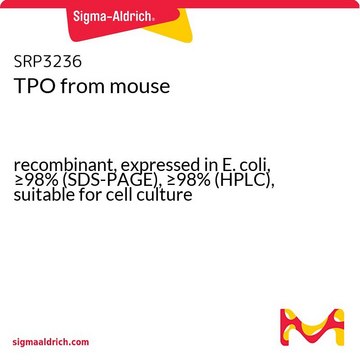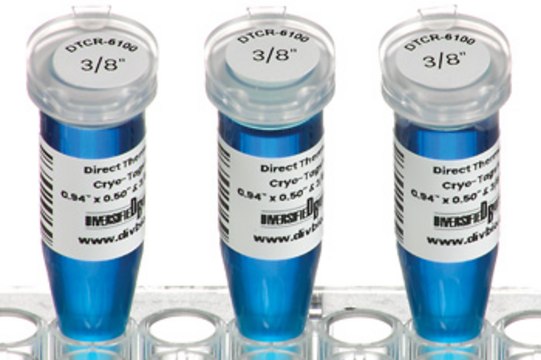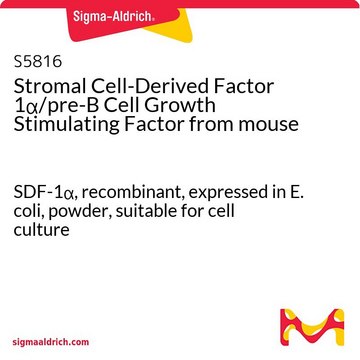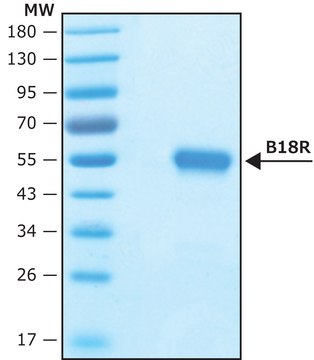T4184
Thrombopoietin from mouse
recombinant, expressed in NSO cells, lyophilized powder, suitable for cell culture, >97% (SDS-PAGE)
Synonym(s):
TPO
Sign Into View Organizational & Contract Pricing
All Photos(1)
About This Item
Recommended Products
biological source
mouse
Quality Level
recombinant
expressed in NSO cells
Assay
>97% (SDS-PAGE)
form
lyophilized powder
potency
2.1 ng/mL EC50
mol wt
~75 kDa by SDS-PAGE (as a result of glycosylation)
predicted mol wt 35 kDa
packaging
pkg of 5 μg
storage condition
avoid repeated freeze/thaw cycles
technique(s)
cell culture | mammalian: suitable
impurities
endotoxin, tested
UniProt accession no.
storage temp.
−20°C
Gene Information
mouse ... Thpo(21832)
Application
Thrombopoietin from mouse can be used in a genetic screening test for examining the role of somatic activating mutations in EPOR, MPL, or GCSFR genes in activating myeloproliferative disorders (MPD) in JAK2V617F-negative MPD patients.
Biochem/physiol Actions
TPO is a ligand for the c-mpl proto-oncogene (Mpl-L), a megakaryocyte colony stimulating factor (Meg-CSF), and a primary regulatory factor for megakaryocytopoiesis and thrombopoiesis. TPO is a humoral glycoprotein that stimulates growth and maturation of megakaryocytes and megakaryocytic colonies from bone marrow cultures. TPO binds and activates a 68-78 kDa glycoprotein receptor belonging to the GH family of cytokine receptors, a family that includes receptors to growth hormone (GH), erythropoietin (EPO) and prolactin (PRL). TPO receptors are found on megakaryocytes and their precursors and on platelets. The mature form of TPO is a highly conserved, showing approximately 70% sequence homology among various mammals.
Thrombopoeitin (TPO), also known as the ligand for the c-mpl proto-oncogene (Mpl-L) and as megakaryocyte colony stimulating factor (Meg-CSF), is a primary regulatory factor for megakaryocytopoiesis and thrombopoiesis. Produced mainly by hepatocytes but also by kidney cells, TPO is a humoral glycoprotein that stimulates growth and maturation of megakaryocytes and megakaryocytic colonies from bone marrow cultures. TPO binds and activates an 68-78 kDa glycoprotein receptor belonging to the GH family of cytokine receptors, a family that includes receptors to growth hormone (GH), erythropoietin (EPO) and prolactin (PRL). Like GH and EPO, TPO may bind to its receptor at two distinct sites, initiating receptor dimerization and activation. Analysis of mRNA indicates also the existence of a novel truncated and potentially soluble form of TPO receptor. The viral oncogene v-mlp of the myeloproliferative leukemia virus (MPLV) contains the gene sequence for the entire cytoplasmic and transmembrane domains and a portion of the extracellular domain of c-mlp (TPO receptor). TPO receptors are found on megakaryocytes and their precursors and on platelets. The mature form of TPO is a highly conserved glycoprotein, showing approximately 70% sequence homology among various mammals. Human TPO contains 332 amino acids (mouse 335) including two internal disulfide bonds and 6 N-linked glycosylation sites (mouse 7). The N-terminal 153 amino acid region of TPO shows structural and amino acid sequence homology to erythropoietin and a pair of arginines (potential cleavage site) separating it from the highly glycosylated carboxyterminal domain.
Thrombopoietin from mouse is an amino acid peptide that plays a pivotal role in megakaryocyte proliferation and differentiation. It also serves as a growth factor for liver endothelial cells in mouse.
Physical form
Lyophilized from a 0.2 μm filtered solution in phosphate buffered saline containing 0.25 mg bovine serum albumin
Analysis Note
The biological activity was measured in a cell proliferation assay using MO7e cells.
Storage Class Code
11 - Combustible Solids
WGK
WGK 3
Flash Point(F)
Not applicable
Flash Point(C)
Not applicable
Personal Protective Equipment
dust mask type N95 (US), Eyeshields, Gloves
Choose from one of the most recent versions:
Already Own This Product?
Find documentation for the products that you have recently purchased in the Document Library.
Our team of scientists has experience in all areas of research including Life Science, Material Science, Chemical Synthesis, Chromatography, Analytical and many others.
Contact Technical Service